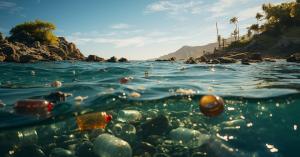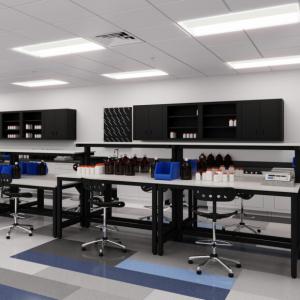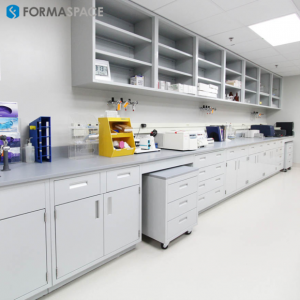
Plastics Recycling is a Failure - How to Solve the Problem
We look at the underlying treaty negotiations and new alternatives to plastics being developed by laboratory researchers.
Given all the breaking news stories in the last few months, perhaps you were not aware that member countries of the United Nations came together in April to negotiate a new Global Plastics Treaty.
Advocates of a global treaty argue that plastic pollution is a worldwide problem and that it will take an international binding agreement to slow (or hopefully reverse) the damage that plastics (especially microplastic pollution) are causing to our oceans and the human food chain that we depend upon.
Proponents of a strong treaty not only wanted to address problems of single-use plastics but also to place overall limits on the production of plastic polymers, including the phase-out of what they described as dangerous PVC, polystyrene, and polyurethane plastics, while severely restricting the high-volume manufacture of polyethylene, polypropylene and PET plastics most associated with environmental plastic pollution. Such an agreement would reduce the use of plastic polymers by 40% between 2025 and 2040.
The seven days of negotiations in Ottawa resulted in two major decisions that disappointed these environmental advocates.
The first was a major decision by UN delegates to limit the scope of the treaty to downstream plastics pollution only rather than consider the full lifecycle of fossil fuel-derived polymer production, downstream plastics production, and distribution.
The second decision was to kick the proverbial negotiations can down the road. Environmental advocates had hoped a binding treaty could be ratified during the Ottawa sessions. Instead, there was an agreement to complete this by the end of 2024, presumably at the fifth Global Plastic Treaty negotiations to be held 25 November – 1 December 2024 in Busan, South Korea.
New Research Indicates that Much Less Plastic gets Recycled than we Thought
Given the depressing amounts of plastic that end up in the oceans, as evidenced by the Great Pacific Garbage Patch – a slow-spinning gyre of primarily junk plastic circulating in the Pacific that’s so large it can be seen from space – it may not surprise you that researchers have recently published a study that much less plastic get recycled than you might think.
This report, from the Center for Climate Integrity, is a blistering takedown of the plastic industry’s efforts to promote a virtuous “circular” life cycle of plastic production and recycling, calling the industry’s claims of successfully recycling enough plastic a fraud.
That’s a pretty extreme claim.
But they may have a valid point about the small amount of plastic that gets recycled.
The U.S. Department of Energy’s (DOE’s) National Renewable Energy Laboratory (NREL) estimates that in 2019, only 5% of plastic in the U.S. was recycled, with 86% buried in landfills and the remainder burned to produce electricity. You can read the full paper here: https://doi.org/10.1016/j.resconrec.2022.106363
Why is Large-Scale Plastics Recycling so Challenging?
There are practical problems with large-scale plastic recycling programs.
The first problem is yield.
Unlike waste plastics, glass, and aluminum scrap can be successfully melted down into new bottles or aluminum cans, again and again.
On the other hand, scrap plastic that’s melted down for reuse is generally inferior to the original raw material, e.g. virgin polymers created from fossil fuels. Plastic scrap that is recycled multiple times becomes severely degraded, limiting its use.
Handling costs are another barrier to plastics recycling.
Even the simplest case, e.g. recycling an item made from a single type of plastic, is made more difficult because plastic materials need to be segregated according to type before recycling (witness the recycling classification codes typically molded into plastic containers), which drives up cost significantly.
Consumer products made of mixed materials are even more expensive to handle in volume, especially electronic devices containing private data. Recently, it was reported that Apple is resorting to shredding and smelting old iPhones to dispose of them, an expensive and energy-intensive process that produces lower yields than hand-disassembling components and segregating them for recycling.
In answer to these problems, the plastics industry is proposing a solution called “advanced chemical recycling” capable of recycling plastics again and again. This new approach uses chemicals to break hard-to-process plastic scrap, such as polystyrene, into the original chemical building blocks, making them a “good-as-new” raw material for plastics manufacturers.
Read more...
Julia Solodovnikova
Formaspace
+1 800-251-1505
email us here
Visit us on social media:
Facebook
X
LinkedIn
Distribution channels: Culture, Society & Lifestyle, Environment, Natural Disasters, Waste Management, World & Regional
Legal Disclaimer:
EIN Presswire provides this news content "as is" without warranty of any kind. We do not accept any responsibility or liability for the accuracy, content, images, videos, licenses, completeness, legality, or reliability of the information contained in this article. If you have any complaints or copyright issues related to this article, kindly contact the author above.
Submit your press release


